Opera New Work Reading: Featuring Composer Justine F. Chen
Opera New Work Reading: Featuring Composer Justine F. Chen
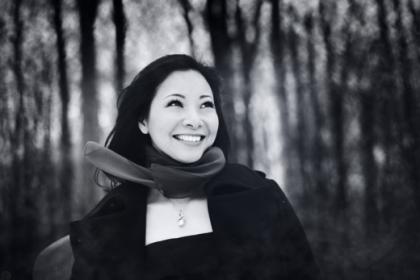
The livestream for this event will be available to view only during the performance. The video will not be available to view after the concert.
Event Attributes
Presented By
For more information regarding accessible accommodations, please click here.
Join us in person at The Clarice or watch the livestream from the comfort of your home.
The annual opera new work reading creates opportunities to highlight new contributions to the opera repertoire from emerging voices. This year, join members of the Maryland Opera Studio (MOS) and the women's chamber vocal ensemble Femmes de Chanson for an evening of music culminating the weeklong residency of Taiwanese-American composer Justine F. Chen. Building on the long tradition of new work exploration, MOS performs excerpts of Chen’s recent and newly created works alongside introductions by the composer, demonstrating the remarkable depth and importance of this prominent compositional voice.
Program:
Select Scenes From The Life and Death(s) of Alan Turing
Excerpt From Seven Sisters
Starry Night String Quartet
About the Maryland Opera Studio:
Under the direction of Craig Kier, the Maryland Opera Studio is dedicated to the future of opera. Preparing the next generation of great singers and offering performances ranging from classic repertoire to provocative new works, it is building contemporary audiences for opera and advancing the art that sustains them.
Health + Safety
All patrons 12 years of age and older are required to provide proof of vaccination or a negative COVID-19 test result from a test taken within 48 hours of the performance for entry into the venue (home tests will NOT be accepted).
Masks must be worn at all times. Please see our Health + Safety page for more information.
PROGRAM MENU: PROGRAM • SYNOPSIS • CREATOR'S NOTE • ABOUT THE ARTISTS
PROGRAM
Amanda Consol
SYNOPSIS
THE LIFE AND DEATH(S) OF ALAN TURING
Scene Synopsis
CREATOR'S NOTE
ARTISTS
%20(1).jpg) Native New Yorker composer/violinist Justine F. Chen’s “propulsive, emotionally resonant” “lyrical, atmospheric… striking“ music “balances despair and humor.” Her latest opera The Life and Death(s) of Alan Turing was described as “inventive…revelatory” by the Chicago Reader. Her work has been performed and commissioned by New York City Opera, New York City Ballet, The Juilliard School, Banff Music Centre, The Crossing, New York Festival of Song, JACK Quartet, American Composers Orchestra, Chicago Opera Theater, New Juilliard Ensemble, Washington Ballet, Brooklyn Philharmonic, Taiwan’s SPRINGAUTUMN Festival, American Lyric Theater, Chants Libres, Bowdoin Music Festival, Merola Opera and Tapestry Opera.
Native New Yorker composer/violinist Justine F. Chen’s “propulsive, emotionally resonant” “lyrical, atmospheric… striking“ music “balances despair and humor.” Her latest opera The Life and Death(s) of Alan Turing was described as “inventive…revelatory” by the Chicago Reader. Her work has been performed and commissioned by New York City Opera, New York City Ballet, The Juilliard School, Banff Music Centre, The Crossing, New York Festival of Song, JACK Quartet, American Composers Orchestra, Chicago Opera Theater, New Juilliard Ensemble, Washington Ballet, Brooklyn Philharmonic, Taiwan’s SPRINGAUTUMN Festival, American Lyric Theater, Chants Libres, Bowdoin Music Festival, Merola Opera and Tapestry Opera. David Simpatico is a playwright, librettist and performance artist whose work has been presented at major theatres around the globe, including London’s Hammersmith Apollo, Lincoln Center, Williamstown Theatre Festival and the New York Shakespeare Festival. Career highlights include: the stage adaptation of High School Musical (Disney Theatricals;) the grand opera, The Life and Death(s) of Alan Turing (Justine Chen, composer;) the music drama, The Screams of Kitty Genovese (Will Todd, composer;) and the libretto for Pulitzer Prize-winner Aaron J. Kernis’ choral symphony, Garden of Light, commissioned by Michael Eisner and The Disney Company (NY Philharmonic, conducted by Kurt Masur).
David Simpatico is a playwright, librettist and performance artist whose work has been presented at major theatres around the globe, including London’s Hammersmith Apollo, Lincoln Center, Williamstown Theatre Festival and the New York Shakespeare Festival. Career highlights include: the stage adaptation of High School Musical (Disney Theatricals;) the grand opera, The Life and Death(s) of Alan Turing (Justine Chen, composer;) the music drama, The Screams of Kitty Genovese (Will Todd, composer;) and the libretto for Pulitzer Prize-winner Aaron J. Kernis’ choral symphony, Garden of Light, commissioned by Michael Eisner and The Disney Company (NY Philharmonic, conducted by Kurt Masur).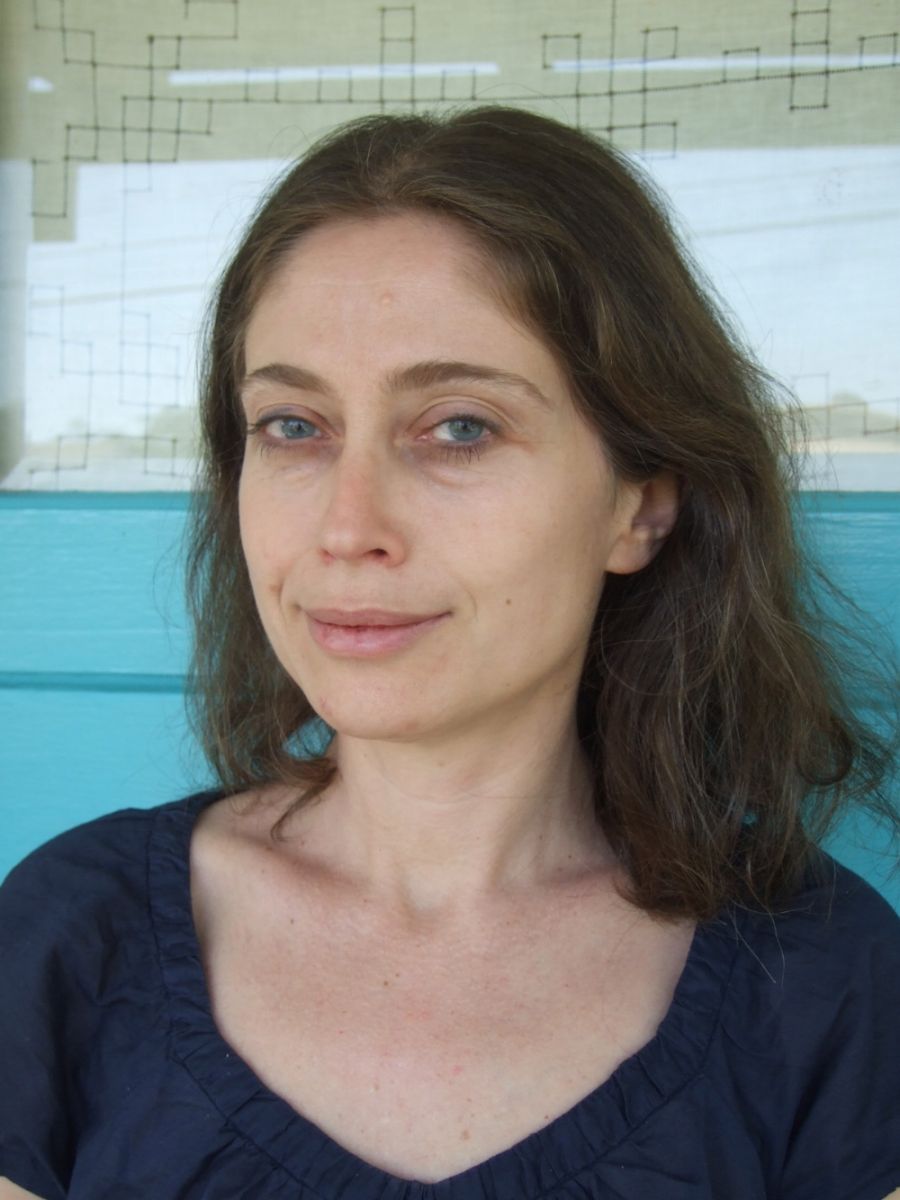 Stephanie Fleischmann is a playwright and librettist whose texts serve as blueprints for intricate three-dimensional sonic and visual worlds. She has been called a “neo Emily Dickinson” (Backstage) and “a writer who can conjure something between a dreamy road movie and a theatrical coming-of-age tale, and who can piece these elements together in the style of a jagged ballad for guitar” (Chicago Sun Times). Her “lyrical monologues” (The New York Times), “smart” opera libretti (Opera News), plays and music-theater works have been performed internationally and across the U.S.
Stephanie Fleischmann is a playwright and librettist whose texts serve as blueprints for intricate three-dimensional sonic and visual worlds. She has been called a “neo Emily Dickinson” (Backstage) and “a writer who can conjure something between a dreamy road movie and a theatrical coming-of-age tale, and who can piece these elements together in the style of a jagged ballad for guitar” (Chicago Sun Times). Her “lyrical monologues” (The New York Times), “smart” opera libretti (Opera News), plays and music-theater works have been performed internationally and across the U.S. 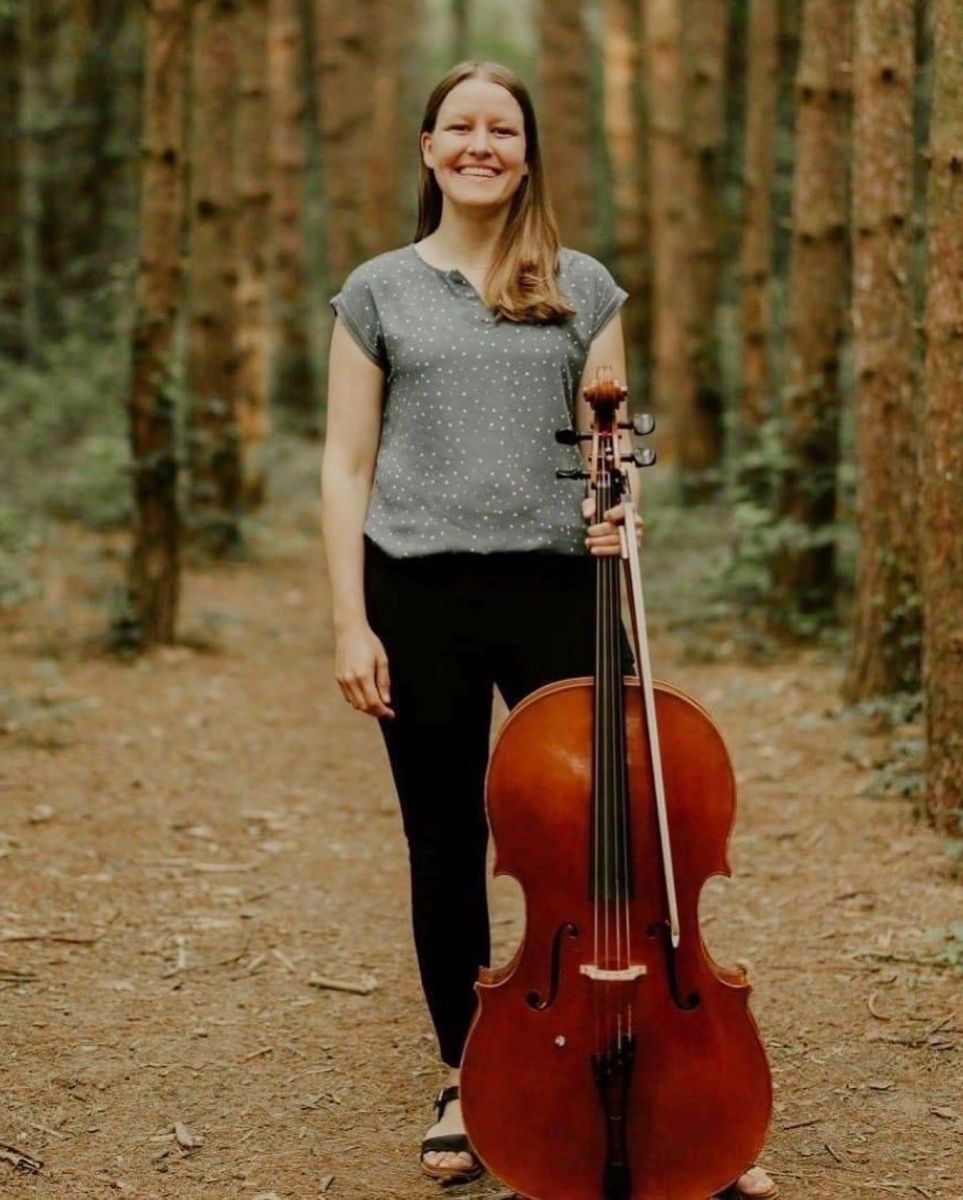 Cellist Wesley Hornpetrie enjoys a career in chamber music, theater and interarts collaboration as a performer and improviser. She is most energized working on new compositions and projects where voices, sound worlds and stories are cultivated into something that can reflect our humanity and create community. A native of Oklahoma City, Hornpetrie now enjoys performing, collaborating and teaching around the Washington D.C. region. She is mostly active as a member of Virago, a mixed quartet that melds free improvisation and contemporary chamber music into a contagious headspace of out-of-the box expression. Additionally, she is a founding member of Girlnoise and her new music cello quartet, Hole in the Floor. As an arts administrator, she is the founder and executive director of Michigan-based music festival, Third Place [MusicFest]. As a performer, Hornpetrie has most recently collaborated with composers including Bryce Dessner, Annika Socolofsky, Tanner Porter, among others, and ensembles including Roomful of Teeth, JACK Quartet and the Grand Rapids Ballet. She has been coached in chamber settings by yMusic, Harlem quartet and International Contemporary Ensemble. Notable collaborations include performing the world premiere of Bryce Dessner’s work, Triptych (Eyes of One on Another), performing it alongside Roomful of Teeth.
Cellist Wesley Hornpetrie enjoys a career in chamber music, theater and interarts collaboration as a performer and improviser. She is most energized working on new compositions and projects where voices, sound worlds and stories are cultivated into something that can reflect our humanity and create community. A native of Oklahoma City, Hornpetrie now enjoys performing, collaborating and teaching around the Washington D.C. region. She is mostly active as a member of Virago, a mixed quartet that melds free improvisation and contemporary chamber music into a contagious headspace of out-of-the box expression. Additionally, she is a founding member of Girlnoise and her new music cello quartet, Hole in the Floor. As an arts administrator, she is the founder and executive director of Michigan-based music festival, Third Place [MusicFest]. As a performer, Hornpetrie has most recently collaborated with composers including Bryce Dessner, Annika Socolofsky, Tanner Porter, among others, and ensembles including Roomful of Teeth, JACK Quartet and the Grand Rapids Ballet. She has been coached in chamber settings by yMusic, Harlem quartet and International Contemporary Ensemble. Notable collaborations include performing the world premiere of Bryce Dessner’s work, Triptych (Eyes of One on Another), performing it alongside Roomful of Teeth.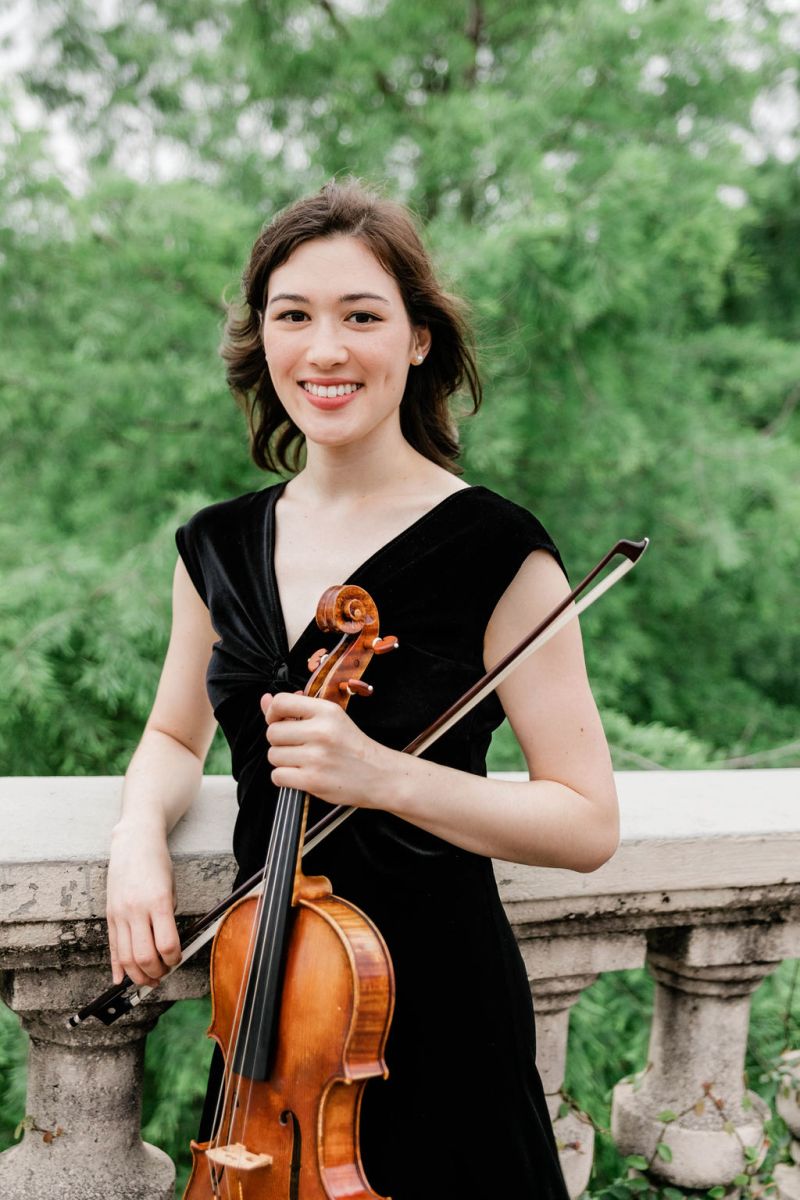 Passionate about performance, D.C. based violist, Tonya Burton can be found performing in diverse venues across the United States. She has been a guest artist for the Houston Viola Society, Texas A&M Corpus Christi, Texas Lutheran University and has been featured on the All Classical Portland 89.9 station as well as the Los Angeles KCRW 89.9 station. Burton is a core member of the KINETIC, both performing and programming for the Houston-based chamber ensemble known for showcasing diverse and under-represented classical music. She is also a founding member of the D.C. based Natonya duo, has played with the Kaleidoscope Chamber Orchestra in Los Angeles and performs annually at the Caroga Lake Music Festival in the Adirondacks of New York.
Passionate about performance, D.C. based violist, Tonya Burton can be found performing in diverse venues across the United States. She has been a guest artist for the Houston Viola Society, Texas A&M Corpus Christi, Texas Lutheran University and has been featured on the All Classical Portland 89.9 station as well as the Los Angeles KCRW 89.9 station. Burton is a core member of the KINETIC, both performing and programming for the Houston-based chamber ensemble known for showcasing diverse and under-represented classical music. She is also a founding member of the D.C. based Natonya duo, has played with the Kaleidoscope Chamber Orchestra in Los Angeles and performs annually at the Caroga Lake Music Festival in the Adirondacks of New York.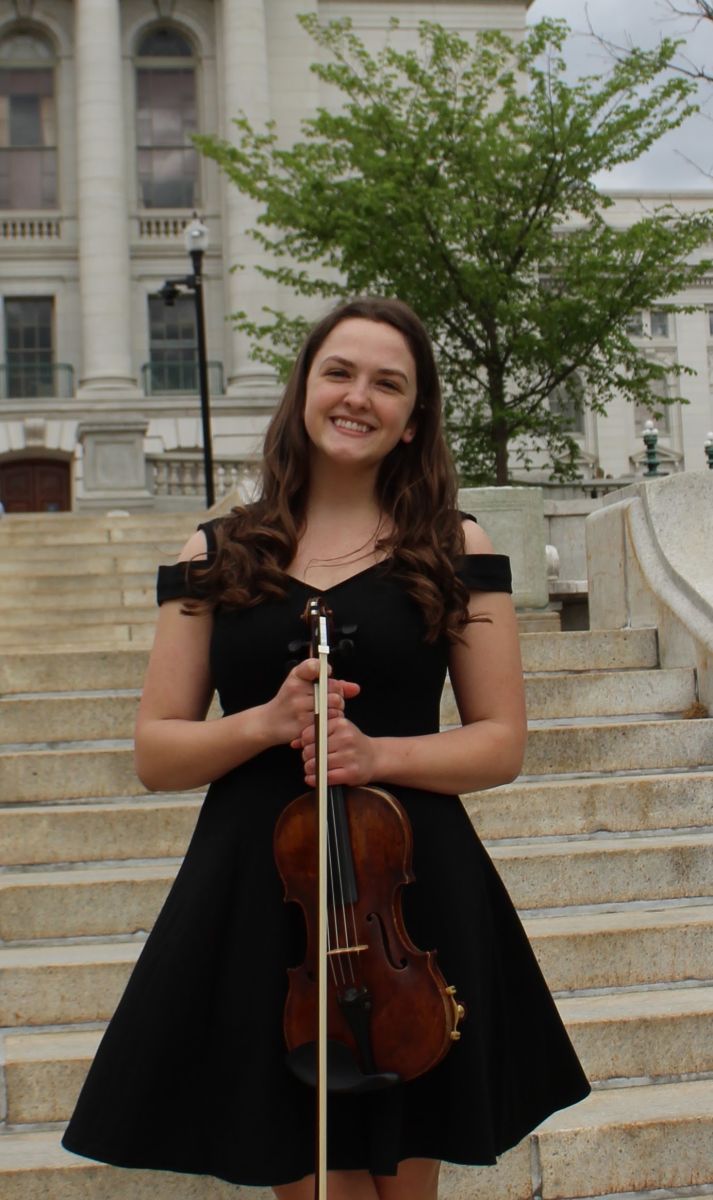 Anna Luebke began Suzuki violin studies at age four. Currently, she is a master’s student in violin performance studying with Professors David Salness and Irina Muresanu at the University of Maryland, where she holds an ensemble assistantship position. In Maryland, she also maintains a private teaching studio and is a violin instructor for Chevy Chase Music, teaching lessons in the greater D.C. area. Luebke earned her Bachelor of Arts degree in violin performance with Dr. Soh-Hyun Park Altino at the University of Wisconsin-Madison. There, her piano trio was a winner of the 2019 Beethoven Chamber Music Competition, and her string quartet, Solana, participated in a residency with the affiliate ensemble of Carnegie Hall, Decoda. As a chamber musician, Luebke has performed in masterclasses led by Orion Weiss, Christine Lamprea, Elisabeth Adkins, the Escher String Quartet, the Harlem Quartet and The Knights Orchestra.
Anna Luebke began Suzuki violin studies at age four. Currently, she is a master’s student in violin performance studying with Professors David Salness and Irina Muresanu at the University of Maryland, where she holds an ensemble assistantship position. In Maryland, she also maintains a private teaching studio and is a violin instructor for Chevy Chase Music, teaching lessons in the greater D.C. area. Luebke earned her Bachelor of Arts degree in violin performance with Dr. Soh-Hyun Park Altino at the University of Wisconsin-Madison. There, her piano trio was a winner of the 2019 Beethoven Chamber Music Competition, and her string quartet, Solana, participated in a residency with the affiliate ensemble of Carnegie Hall, Decoda. As a chamber musician, Luebke has performed in masterclasses led by Orion Weiss, Christine Lamprea, Elisabeth Adkins, the Escher String Quartet, the Harlem Quartet and The Knights Orchestra. 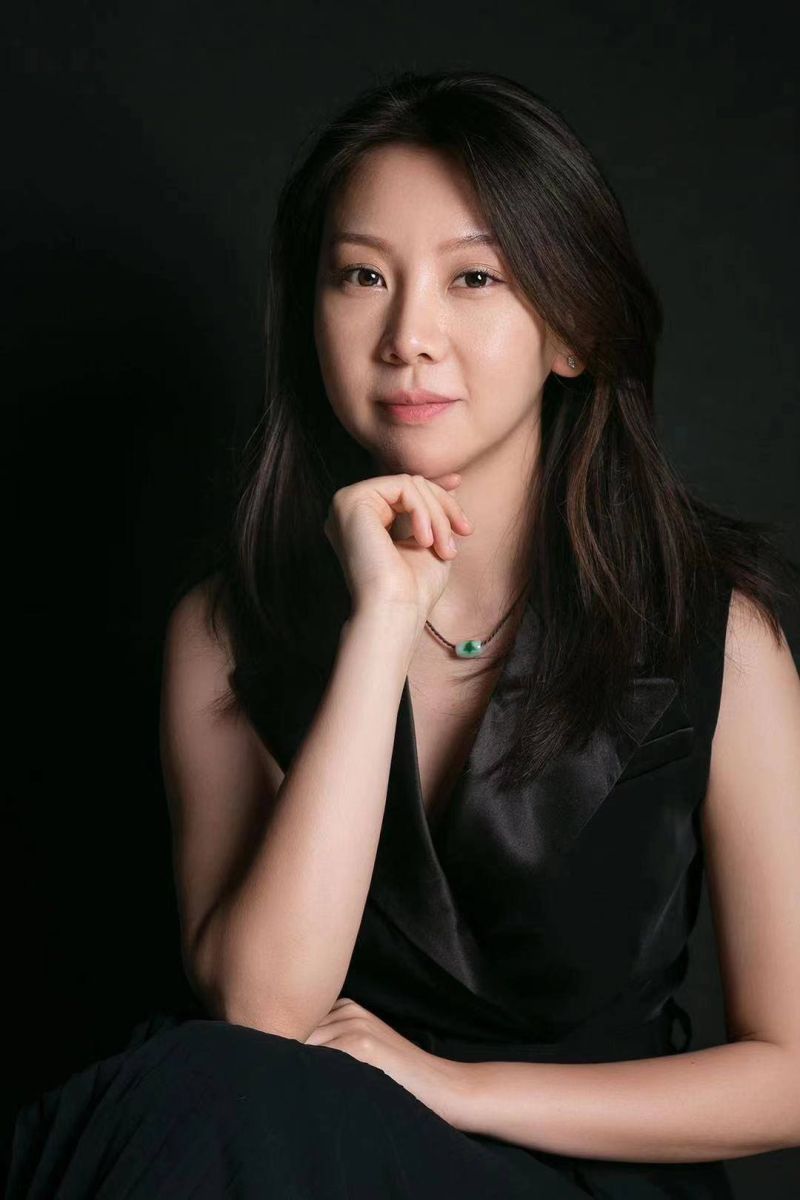 Collaborative pianist Erica Xiaoyan Guo is currently pursuing her D.M.A. in collaborative piano at the University of Maryland. Her teachers include Rita Sloan, Kathleen Kelly, Cameron Stowe, Jonathan Feldman, Antti Siirala and Solomon Mikowsky. Guo holds a master’s degree in collaborative piano from the New England Conservatory of Music, a master’s degree in solo piano performance from Hochschule für Musik und Theater München and a Bachelor of Music from the Manhattan School of Music, with further studies with the Merola Opera Program, Aspen Music Festival and School, and Pittsburgh Festival Opera. She has become a highly sought after collaborator in both opera and song repertoire. Her operatic repertoire includes La finta giardiniera, Owen Wingrave, Die Zauberflöte, Falstaff, Partenope, The Bartered Bride, Proving Up (Missy Mazzoli), Le Nozze di Figaro and La Bohème as well as an extensive catalog of song repertoire. This Spring, Guo will have her Schwabacher debut recital in San Francisco.
Collaborative pianist Erica Xiaoyan Guo is currently pursuing her D.M.A. in collaborative piano at the University of Maryland. Her teachers include Rita Sloan, Kathleen Kelly, Cameron Stowe, Jonathan Feldman, Antti Siirala and Solomon Mikowsky. Guo holds a master’s degree in collaborative piano from the New England Conservatory of Music, a master’s degree in solo piano performance from Hochschule für Musik und Theater München and a Bachelor of Music from the Manhattan School of Music, with further studies with the Merola Opera Program, Aspen Music Festival and School, and Pittsburgh Festival Opera. She has become a highly sought after collaborator in both opera and song repertoire. Her operatic repertoire includes La finta giardiniera, Owen Wingrave, Die Zauberflöte, Falstaff, Partenope, The Bartered Bride, Proving Up (Missy Mazzoli), Le Nozze di Figaro and La Bohème as well as an extensive catalog of song repertoire. This Spring, Guo will have her Schwabacher debut recital in San Francisco..png) Stage Director Amanda Consol’s recent projects include a double bill of Cendrillon and Savitri for Wolf Trap Opera, Street Scene and The Dialogues of the Carmelites at the Maryland Opera Studio, and workshops and readings of new works with companies including Vital Opera and Washington National Opera (WNO). At WNO, Consol’s work includes programs for the American Opera Initiative and scenes programs with the Cafritz Young Artists where she has also served as dramatic instructor. Consol teaches young artists around the country for programs including CoOPERAtive at the Westminster Choir College, Sewanee Music Festival and at the University of Maryland where she has served as the director of acting for the Maryland Opera Studio since 2018.
Stage Director Amanda Consol’s recent projects include a double bill of Cendrillon and Savitri for Wolf Trap Opera, Street Scene and The Dialogues of the Carmelites at the Maryland Opera Studio, and workshops and readings of new works with companies including Vital Opera and Washington National Opera (WNO). At WNO, Consol’s work includes programs for the American Opera Initiative and scenes programs with the Cafritz Young Artists where she has also served as dramatic instructor. Consol teaches young artists around the country for programs including CoOPERAtive at the Westminster Choir College, Sewanee Music Festival and at the University of Maryland where she has served as the director of acting for the Maryland Opera Studio since 2018..jpeg) Lawrence Barasa (Kenya) Christopher Morcom, tenor, developed his artistic profile as a member and assistant production manager of the Kenyan Boys Choir. In this capacity he interacted and performed with artists including the Jonas Brothers, Ellie Goulding, Ciara and Demi Lovato. Barasa has performed the roles of Spoletta in Astoria Music Festival and Eugene Opera’s production of Tosca. He also appeared as Don Basilio and Don Curzio in Le nozze di Figaro at the Astoria Music Festival in 2018, Hoffmann in Les contes d’Hoffmann and Don José in La Tragedy de Carmen at the University of Oregon. Barasa completed training at the Savannah Voice Festival 2019–20 under the tutelage of Sherrill Milnes and Maria Zouaves. Barasa graduated from the University of Oregon with a vocal performance degree under Karen Esquivel. He is currently a graduate international student at the University of Maryland Opera Studio studying with Professor Delores Ziegler.
Lawrence Barasa (Kenya) Christopher Morcom, tenor, developed his artistic profile as a member and assistant production manager of the Kenyan Boys Choir. In this capacity he interacted and performed with artists including the Jonas Brothers, Ellie Goulding, Ciara and Demi Lovato. Barasa has performed the roles of Spoletta in Astoria Music Festival and Eugene Opera’s production of Tosca. He also appeared as Don Basilio and Don Curzio in Le nozze di Figaro at the Astoria Music Festival in 2018, Hoffmann in Les contes d’Hoffmann and Don José in La Tragedy de Carmen at the University of Oregon. Barasa completed training at the Savannah Voice Festival 2019–20 under the tutelage of Sherrill Milnes and Maria Zouaves. Barasa graduated from the University of Oregon with a vocal performance degree under Karen Esquivel. He is currently a graduate international student at the University of Maryland Opera Studio studying with Professor Delores Ziegler..jpeg) Michael Butler (Bowie, MD) Arnold Murray, tenor, is a first-year student in the Maryland Opera Studio. He is a graduate of the University of Maryland School of Music, earning his B.M. in vocal performance in 2021. Butler made his New York City Opera debut in Summer 2020, and his Des Moines Metro Opera debut in Summer 2021. Butler’s most recent roles include Prince Sou-Chong in Lehár’s Das Land des Lächelns with Washington Opera Society (2018), Claudio in the world premiere of Francis Pollock’s Briscula the Magician with Belcantanti Opera Company, Dancaire in Bizet’s Carmen with Washington Opera Society, Messenger in Verdi’s Aïda with Washington Opera Society, Tamino in Mozart’s Die Zauberflöte with Bethesda Music Festival, Borsa in Verdi’s Rigoletto with Belcantanti Opera Company, Ivan Lykov in Rimsky-Korsakov’s The Czar’s Bride with Belcantanti Opera Company and the title role in Rossini’s Le Comte Ory with Chicago Summer Opera. Upcoming engagements include concerts with Mid-Atlantic Symphony Orchestra and Baltimore Concert Opera in February of 2022, and the title role of Gounod’s Faust in March 2022. Butler is a student of bass-baritone Kevin Short.
Michael Butler (Bowie, MD) Arnold Murray, tenor, is a first-year student in the Maryland Opera Studio. He is a graduate of the University of Maryland School of Music, earning his B.M. in vocal performance in 2021. Butler made his New York City Opera debut in Summer 2020, and his Des Moines Metro Opera debut in Summer 2021. Butler’s most recent roles include Prince Sou-Chong in Lehár’s Das Land des Lächelns with Washington Opera Society (2018), Claudio in the world premiere of Francis Pollock’s Briscula the Magician with Belcantanti Opera Company, Dancaire in Bizet’s Carmen with Washington Opera Society, Messenger in Verdi’s Aïda with Washington Opera Society, Tamino in Mozart’s Die Zauberflöte with Bethesda Music Festival, Borsa in Verdi’s Rigoletto with Belcantanti Opera Company, Ivan Lykov in Rimsky-Korsakov’s The Czar’s Bride with Belcantanti Opera Company and the title role in Rossini’s Le Comte Ory with Chicago Summer Opera. Upcoming engagements include concerts with Mid-Atlantic Symphony Orchestra and Baltimore Concert Opera in February of 2022, and the title role of Gounod’s Faust in March 2022. Butler is a student of bass-baritone Kevin Short..jpg) Henrique Carvalho (São Paulo, Brazil) Alan Turing, baritone, is a first-year student in the Maryland Opera Studio. He earned his bachelor's degree in voice performance from the University of Maryland School of Music. Carvalho's most recent roles include the Speaker in Maryland Opera Studio's production of Mozart’s Die Zauberflöte (2021), Jake in the Annapolis Opera and Maryland Opera Studio's co-production of Sunder by Nailah Nombeko and Alicia Haymer (2021), and the title role in Thomas Pasatieri's Signor Deluso with the University of Maryland's student-run opera company OperaTerps (2020). Carvalho is a student of Kevin Short.
Henrique Carvalho (São Paulo, Brazil) Alan Turing, baritone, is a first-year student in the Maryland Opera Studio. He earned his bachelor's degree in voice performance from the University of Maryland School of Music. Carvalho's most recent roles include the Speaker in Maryland Opera Studio's production of Mozart’s Die Zauberflöte (2021), Jake in the Annapolis Opera and Maryland Opera Studio's co-production of Sunder by Nailah Nombeko and Alicia Haymer (2021), and the title role in Thomas Pasatieri's Signor Deluso with the University of Maryland's student-run opera company OperaTerps (2020). Carvalho is a student of Kevin Short. Victoria McGrath (New York, NY), Sara Turing, soprano, is a first-year student in the Maryland Opera Studio. She is a graduate of Macaulay Honors College at CUNY Queens College, where she graduated magna cum laude with a B.A. in intellectual history and a B.M. in vocal performance. At Queens College, she regularly performed in scenes programs and productions including Le nozze di Figaro, Die Zauberflöte and Suor Angelica. She also participated in intensive language programs in Italy and Germany. Upcoming performances include engagements with the Mid-Atlantic Symphony Orchestra and Baltimore Musicales. McGrath is a student of Jennifer Casey Cabot.
Victoria McGrath (New York, NY), Sara Turing, soprano, is a first-year student in the Maryland Opera Studio. She is a graduate of Macaulay Honors College at CUNY Queens College, where she graduated magna cum laude with a B.A. in intellectual history and a B.M. in vocal performance. At Queens College, she regularly performed in scenes programs and productions including Le nozze di Figaro, Die Zauberflöte and Suor Angelica. She also participated in intensive language programs in Italy and Germany. Upcoming performances include engagements with the Mid-Atlantic Symphony Orchestra and Baltimore Musicales. McGrath is a student of Jennifer Casey Cabot..png) Kira Neary (New York, NY), Sara Turing, soprano, is currently a first-year student in the Maryland Opera Studio. She just finished her undergraduate study at Northwestern University, where she obtained a Bachelor of Music in voice and opera performance alongside a Bachelor of Arts in European history. Neary’s most recent roles include Papagena in Maryland Opera Studio’s Die Zauberflöte, La Musica in Northwestern University’s online production of Monteverdi’s L’Orfeo, the Mother in David T. Little’s Dog Days with Northwestern University Opera Theater (2019), Poppea in Monteverdi’s L’Incoronazione di Poppea at Miami Music Festival (2019) and the title role in Handel's Theodora (2018). She was also a member of the Bienen Contemporary/Early Vocal Ensemble (BCE) where she sang the First Wren in a workshop of The Life and Death(s) of Alan Turing with Chicago Opera Theater. Neary is a student of Kevin Short.
Kira Neary (New York, NY), Sara Turing, soprano, is currently a first-year student in the Maryland Opera Studio. She just finished her undergraduate study at Northwestern University, where she obtained a Bachelor of Music in voice and opera performance alongside a Bachelor of Arts in European history. Neary’s most recent roles include Papagena in Maryland Opera Studio’s Die Zauberflöte, La Musica in Northwestern University’s online production of Monteverdi’s L’Orfeo, the Mother in David T. Little’s Dog Days with Northwestern University Opera Theater (2019), Poppea in Monteverdi’s L’Incoronazione di Poppea at Miami Music Festival (2019) and the title role in Handel's Theodora (2018). She was also a member of the Bienen Contemporary/Early Vocal Ensemble (BCE) where she sang the First Wren in a workshop of The Life and Death(s) of Alan Turing with Chicago Opera Theater. Neary is a student of Kevin Short. Aleea Elaine Powell (Baltimore, MD) Joan Clarke, soprano, is a first-year student in Maryland Opera Studio. She is a graduate of The Juilliard School, where she earned her bachelor’s degree. During her undergraduate study, she was the recipient of the Cecille Weber, Hans J. Heinz and Tatiana Troyanos Scholarship. Powell’s most recent roles include Natalia Katyukova’s Liederabend (2020), Blanche in There’s Blood Between Us- excerpts from Dialogue of the Carmelites (2019), Cleopatra in Guilio Cesare (2019), Susanna in Le nozze di Figaro (2018), Rosina in Il Barbiere di Siviglia (2018), Opera Comp performing ‘Becoming Hawk’ as The Vagrant by Composer/ Co-Founder & Co-Artistic Director Chanson Goldschmitz and Director Ronny Goldschmitz (2018), Dorothy in The Wiz (2016), Violetta in La Traviata (2016), Fiordiligi in Così fan tutte (2015) and Pamina in Die Zauberflöte (2015). Powell is a student of Kevin Short.
Aleea Elaine Powell (Baltimore, MD) Joan Clarke, soprano, is a first-year student in Maryland Opera Studio. She is a graduate of The Juilliard School, where she earned her bachelor’s degree. During her undergraduate study, she was the recipient of the Cecille Weber, Hans J. Heinz and Tatiana Troyanos Scholarship. Powell’s most recent roles include Natalia Katyukova’s Liederabend (2020), Blanche in There’s Blood Between Us- excerpts from Dialogue of the Carmelites (2019), Cleopatra in Guilio Cesare (2019), Susanna in Le nozze di Figaro (2018), Rosina in Il Barbiere di Siviglia (2018), Opera Comp performing ‘Becoming Hawk’ as The Vagrant by Composer/ Co-Founder & Co-Artistic Director Chanson Goldschmitz and Director Ronny Goldschmitz (2018), Dorothy in The Wiz (2016), Violetta in La Traviata (2016), Fiordiligi in Così fan tutte (2015) and Pamina in Die Zauberflöte (2015). Powell is a student of Kevin Short..jpeg) Craig Francis Smith (Rochester, NY) Fred Clayton, baritone, is a first-year student in the Maryland Opera Studio. Smith has performed with the Janiec Opera Company at The Brevard Music Center and the award-winning Crane Opera Ensemble. Recent credits include the title role in Gianni Schicchi, the title role in Le Nozze di Figaro, the Duke in Romeo et Juliette, Ivan in Die Fledermaus and The Superintendent in Tom Cipullo’s world premiere of Mayo. In the 2021–22 season, Smith will be singing Armoured Man/First Priest in Die Zauberflöte and Ronaldo Cabral in Later the Same Evening. Smith has received a Bachelor of Music degree from the Crane School of Music at SUNY Potsdam, where he studied with Colleen Skull. Smith is a student of Kevin Short.
Craig Francis Smith (Rochester, NY) Fred Clayton, baritone, is a first-year student in the Maryland Opera Studio. Smith has performed with the Janiec Opera Company at The Brevard Music Center and the award-winning Crane Opera Ensemble. Recent credits include the title role in Gianni Schicchi, the title role in Le Nozze di Figaro, the Duke in Romeo et Juliette, Ivan in Die Fledermaus and The Superintendent in Tom Cipullo’s world premiere of Mayo. In the 2021–22 season, Smith will be singing Armoured Man/First Priest in Die Zauberflöte and Ronaldo Cabral in Later the Same Evening. Smith has received a Bachelor of Music degree from the Crane School of Music at SUNY Potsdam, where he studied with Colleen Skull. Smith is a student of Kevin Short.